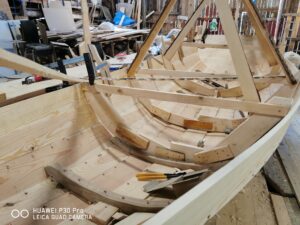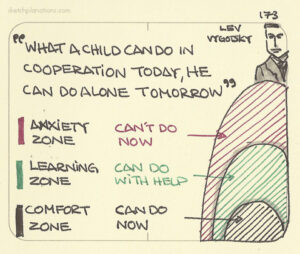Zone of proximal development – while building a boat

Image: Jon Jack
Yes, another wooden boat blog post, I’m turning into that boat person. So, I’m coming onto the closing stages of my yearlong boat building experience. And as with everything I do and probably many others here, it’s viewed through the lens of learning, digital, pedagogy, experience. It is hard not to relate to these things if you are in our line of work especially if it involves instruction or teaching – for me anyway.
I’m going to give a brief overview of some of the things that have gone through my head over the past year while building the boat.
Motor / psychomotor
Have I mentioned that I have blisters and hard hands? There is a clear physical limit to what can be done until your body is capable of maintaining the task, I can only plane a piece of wood for so long without it being too painful to continue, but over time I was able to do more. And equally, I knew how I wanted the worked wood to look and feel, but I didn’t have the requisite skill to achieve it, I kind of have more of it now, but I’m almost finished and can’t go back and correct my poor work from earlier.
This is an area I know little about, so if anyone has any recommended readings, I’d be keen to hear from them.
Scaffolding or zone of proximal development

Image: Sketchplanations.com
There was no scaffolding to be gradually taken away, just an expectation that you are able to do it all straight away. Which for me just didn’t work, I got stuck and was unable to progress at multiple points without help. I always liked an explanation of Vygotsky’s zone of proximal development by Yngve Nordkvelle, while working at Høgskolen I Innlandet.
If you imagine a very small child playing and you place the ball too far away the child looks and thinks it’s too far and doesn’t go for it and gives up, but if placed in a zone that is deemed achievable the child will crawl and get it.
I felt a lot like this in the early stages of boatbuilding, set tasks that were far too difficult, with no step by step guidance given.
Peer Learning
Now, this one is interesting as we often say we want it and will try and design it into a course. But on this one, it kind of formed out of necessity as there were ahem certain gaps in what was being taught, so the other students began teaching each other. On all sorts of topics and techniques, I have the benefit of being the slowest in the group so I can learn from everyone else’s mistakes. I wonder in learning design and course design do we sometimes try and design things that will happen naturally.
Language
I misunderstand a lot! As the teacher insists on the course being taught in Norwegian, even though when signing up he assured me he knew English. Turns out my partner had spoken to him and told him not to speak English with me, so my Norwegian boat building vocabulary has improved a lot. Can be frustrating and comical at times. “forstår du meg?” … me thinking, If I say yes will he leave me alone.
I could go on, but maybe for those of you that have stuck with me this far, I’ll give it a rest.
As always thanks for reading.
Jon




Recent comments